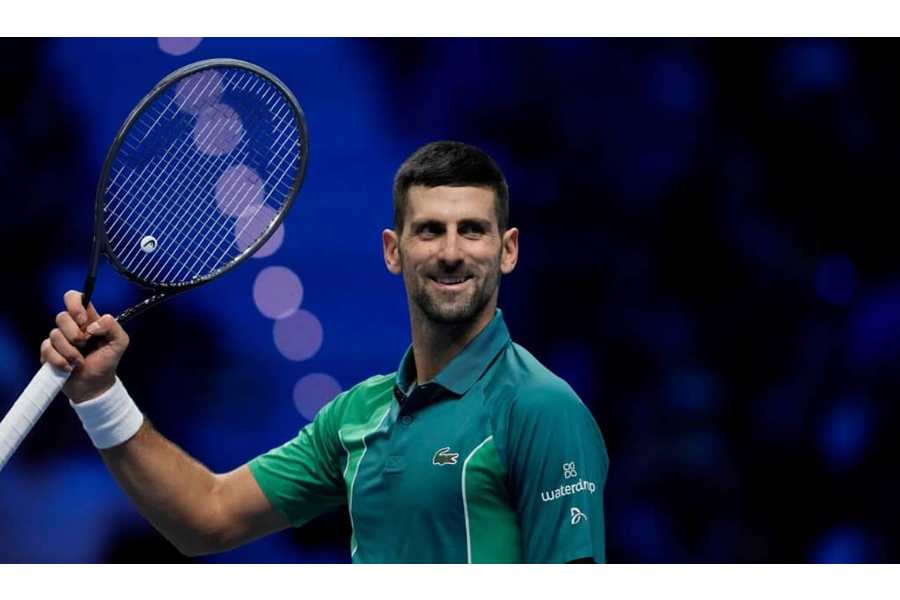
As Dino Prizmic waited by the entrance of Rod Laver Arena before his first grand slam match, he had every reason to be overawed by the occasion. Directly behind him stood Novak Djokovic. Behind both of them sat a series of boards that list each of the former Australian Open champions and the years that they triumphed. Djokovic’s board contains 10 different years.
No matter, the Croatian teenager tackled the best player of all time without fear or favour, forcing Djokovic to find an extra gear in order to survive. After four gruelling hours, his longest first-round match in 14 years, Djokovic advanced to the second round with a 6-2, 6-7 (5), 6-3, 6-4 win.
None of those difficulties were evident early on as Djokovic started the match determined to immediately impose himself and pressure his young opponent. Djokovic cranked up his forehand from the very beginning, opting for riskier than usual direction changes and aiming for lines rather than his typically higher percentage shotmaking. His early aggression yielded quick success as he breezed through the opening set.
At just 18 years old, Prizmic’s talent has been well known for some time and last year the Croat rose to become the French Open boys’ champion. As the first set quickly moved away from him, he did not panic. Despite calling the trainer multiple times in the second set to attend to an ailment to his right thigh, Prizmic gave a comprehensive demonstration of his talents until the end.
He moved brilliantly, sliding around the hard court off both legs, retrieving countless balls and matching Djokovic’s physicality as he emerged victorious in many of the tough, extended rallies. Prizmic’s heavy forehand tore through the court, consistently breaking down Djokovic’s defences. He paired his firepower with solid serving, patience beyond his years and a willingness to finish points at the net.
The pressure from Prizmic elicited numerous uncharacteristic errors from Djokovic and as they battled through the second set tiebreak it was Prizmic who remained extremely solid under pressure to level the match. He continued to impose pressure on Djokovic in the third set, finally breaking serve for a 3-2 lead.
Just as Djokovic seemed to be in danger, though, he raised his level again. The 36-year-old’s return game soared, allowing him to break back immediately, and he served well in the decisive moments. From the break deficit, Djokovic reeled off eight games in a row to establish a 4-0 fourth-set lead.
Still, Prizmic fought until the end. He retrieved one of Djokovic’s breaks, recovered from triple match point down on his serve at 3-5 and then forced Djokovic to close out the match with a strong service game. As the pair embraced at the net, Djokovic heaped praise on his younger opponent. Then, as the full crowd began to cheer its victor, he gestured towards the audience to applaud Prizmic until he departed Rod Laver Arena.
For Djokovic, it was a curious start. His season had already begun under less than ideal circumstances as he struggled with a wrist issue and he was defeated by Alex de Minaur. But Djokovic had asserted before the tournament that he was OK and struck the ball without any visible discomfort.
After yet another dominant season from Djokovic, the most important question surrounding the men’s draw remains whether any player is ready to beat him at the defining tournament of his career. The rest of the field may take solace in seeing Djokovic struggle but despite being pushed he found a way through. So often in his career, these difficult contests have only made him stronger. As Djokovic chases his 11th Australian Open title, he will next face the winner of Monday’s all-Australian first‑round match between Alexei Popyrin and Marc Polmans.
Although the stadium’s day session concluded at 4.25pm, the two and a half hours between sessions meant that Djokovic finally departed the playing arena at around 11.30pm. Part of Tennis Australia’s reasoning for pushing the Australian Open to a Sunday start was to lessen the chances of late-night finishes. In the end, only an imperious performance from Aryna Sabalenka ensured a reasonable finishing time on the opening day as the defending champion demolished Ella Seidel, a German qualifier, 6-0, 6-1 to advance.
Six years since her long-awaited first grand slam title at the 2018 Australian Open and four years after her first retirement at the 2020 Australian Open, Caroline Wozniacki also reached the second round after Magda Linette, the 20th seed and a semi-finalist last year, retired because of injury with Wozniacki leading 6-2, 2-0.
“I feel like I came into this tournament, this year, knowing exactly where I was, where I need to be, and what I need to work on. It’s a little bit different. At the same time I think I have nothing to lose and everything to win,” Wozniacki said.
The women’s draw is filled with comebacks this year, but not every one is a return from injuries or maternity leave. Amanda Anisimova, who reached the semi-finals of the 2019 French Open aged 17, took a break from tennis in April last year in order to address her ailing mental health. Nine months later the 22-year-old returned to grand slam competition with a win, defeating the 13th seed Liudmila Samsonova 6-3 6-4.






